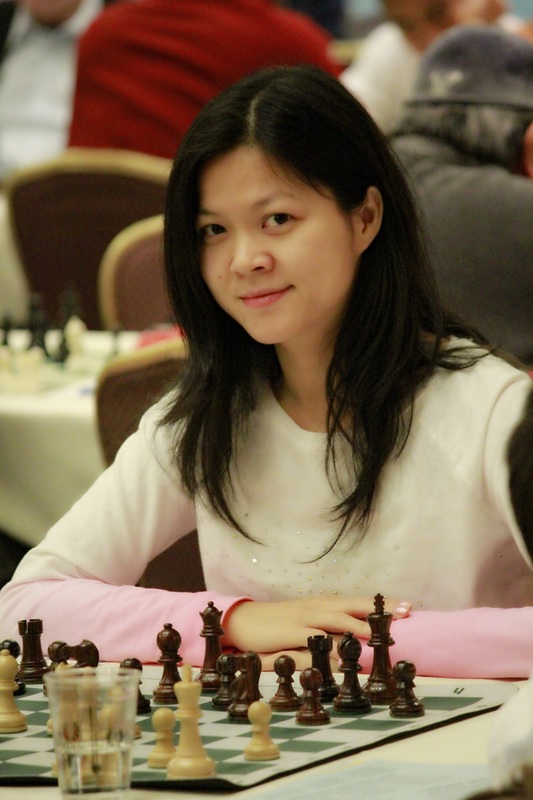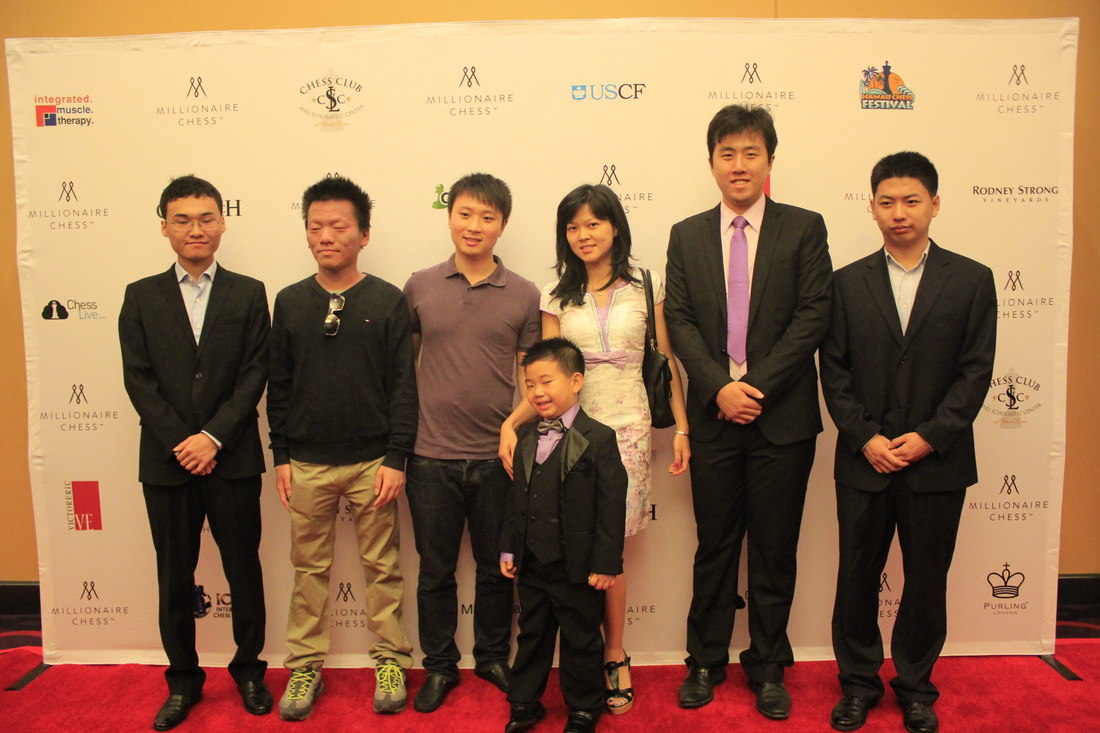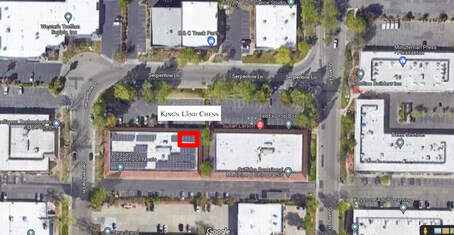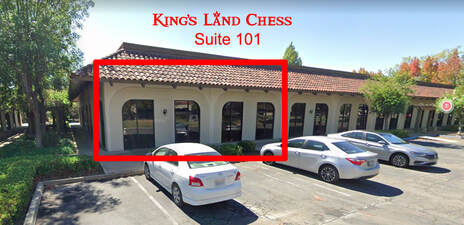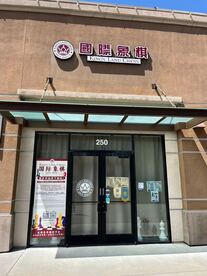中国棋手征战海外,创建中美国际象棋友谊桥梁
Chinese Chess Players Build a Bridge of Friendship between China and USA
with their Expedition to Overseas
|
An unprecedented Millionaire Chess Open Tournament was held in Las Vegas in 2014. The prize was as high as one million US dollars, which leveraged chess tournament to a historical new altitude. It attracted many famous international Grandmasters from around the world to participate. Among the hundreds of players, a Chinese team named Chinese Dragon is particularly noticeable. It is the only Chinese team in this tournament, consisting of players in Chinese National Chess Team and overseas Chinese players in the US, who won the first places in two sections. In the Open Section, half of the quarter-finalists were from the Chinese Dragon Team, and they won a total prize of $ 130,000 in addition to the Best Costume Prize, which could be described as winning of both fame and fortune! The founder and leader of this team was Ms. Ke Chen.
Ke Chen, who was the captain of Chinese National Youth Chess Team, has been extremely active in the Chinese chess field. As a rising chess player, her international rating reached 2140 as early as at the age of 13. Ke Chen maintained her outstanding scores even after she went to study in the US. She is currently ranked top 1% among US women chess players. She had excellent performance in many important US tournaments, e.g. she won the 2nd place in the 2010 US Open Blitz Tournament, the 2nd place in the 2012 North American International Chess Tournament, and the 1st place in the 2014 Southern California Chess Open. She also tied for the 2nd place with International Master Ms. Ruth Haring, the President of United States Chess Federation (USCF) in the first US Women's Open in 2014. Meantime, she works as a professional chess coach and has had great accomplishment as well. Among the students she trained, more than ten won chess championship in the tournaments held in Southern California, and more than a dozen of them have been listed on the Top Hundred Player List of USCF in their age groups. Her favorite student Jonathan Chen, who just turned 7 years old, won the first place in National Scholastic K-12 Championship in December 2014, and won the 2nd place in Susan Polgar National Open for Girls and Boys in February 2015. He will represent the USA at the World Youth Chess Championships in Greece in 2015. Ke Chen is passionate about chess. She views that chess is not only a sport, but also a way of communication, just like a language. Chess can not only improve one's intelligence, logical thinking and computing ability, but also promote the development of the emotional intelligence for children. Children, who have learned chess over time, show more patience, know how to make best choices, and more importantly, understand how to deal with frustration. Playing chess helps children develop advanced thinking skills and responsibility for their own behavior, cultivate their good sportsmanship and self-esteem, and improve their ability to focus on subjects, which are all important factors for their future success. Reflections on chess can apply to the reflection on one’s life. Therefore there is a saying that says chess is like life and life is like chess. She thinks that every elementary school shall have at least one hour chess lesson per week. Ke Chen has started to promote the education of chess in the elementary schools in the US. She launched her chess classes in Quail Summit Elementary School and Evergreen Elementary School in Walnut School District, a top-ranked school district in Los Angeles, and she established chess teams in both schools. The chess team of Evergreen Elementary School won the third place of Team Award in Super State Chess Championship 2015 held in Southern California only six months after it was established. In recent years, China also has a growing number of primary schools who set up chess classes. She hopes that one day chess will become a required course of elementary schools in both China and the US. She also anticipates that she will promote the exchange activities of chess between Chinese and American schools. Currently Ke Chen is actively devoted herself to the Sino-US cultural exchanges, the idea of which stemmed from her early experience when she was a teenager. Because she was living in Shenzhen, she had a lot of opportunities to compete with the children in Hong Kong. It was a novel and interesting experience to her that children with different colors, speaking different languages, and having different cultural backgrounds played in the same arena, which made her eyes and mind wide open. She kept in touch with many foreign friends since then by exchanging mails. Some of them went to Stanford University and Harvard University later. There are high-end chess exchange activities between China and the US, such as the Sino-US Chess Tournament and Sino-US Universities Chess Tournament. However, there are no exchange activities for the juvenile players in the two countries. Ke Chen looks forward to building a bridge of Sino-US cultural exchange of chess for juvenile chess players through her efforts. The chess cultures in China and the US have similarities and differences. In China, people usually focus on its competitiveness and regard it as a sport. In the West, chess is not only embodied the competitiveness of sports, but also shows a lot of cultural characteristics because of its long history. She visited the Mechanics' Institute Chess Club in San Francisco, which is located in a library in downtown San Francisco. It sponsors a chess tournament every Tuesday. The host of her visit was John Donaldson, an International Master. At the entrance of the club, there are a lot of pictures of famous chess masters who played in the chess club, the most famous of whom is Bobby Fischer. Among the players, there were people of all ages ranging from little kids to over sixty-year-old elderly people. Some families participated in the event with all members: the father and the children competed in the tournament side by side, and the mother accompanied next to them. All the players played the games seriously. It showed her a cultural and historical atmosphere. Here, chess has become a life style and a necessary weekly gathering. Coffee and small snacks were placed next to the field, which made you feel it like a cafeteria, or a chess salon. The club was founded in 1854 and has a history of 161 years. There are many chess clubs in Los Angeles, which are similar to it, and most of them have 40-50 years history. Therefore, the chess culture is deeply rooted in the US, and is an integral part of life of many people. There is no chess league in the US yet, but the number of open tournaments far exceeds that in China. Basically there are open tournaments every week. Some are sponsored by national organizations such as Continental Chess Association and are held once a year, while some others are weekly tournaments sponsored by local chess clubs. Children have a lot of training opportunities. Jonathan Chen participated in over 30 tournaments during one year period before he played in National Scholastic K-12 Championship in Florida, about 2.5 tournaments per month. This isn’t much if comparing to his opponents, who surprisingly have participated in more than 200 tournaments, i.e. more than two tournaments a week at the age of 8. This shows how many opportunities of the tournaments there are in the US. In addition, the US rating system is more comprehensive. The rating system formulated by USCF, which is similar to FIDE rating system, is adopted nationwide. This system has over 100 years of history. New players start from 0 and the players’ USCF rating is calculated based on their performance in each game, which ensures the continuity and consistency of the rating. When the players participate in games having different sections, they are determined to attend certain sections by their ratings. Chinese players can also obtain the US rating if participating in the US tournaments. If one performs well and receives the US National Master title or above, he will have a good chance to be admitted to a prestige school and receive a full scholarship at the time when applying for the admission to college. In order to develop the chess exchanges between Chinese and the US juvenile chess players, Ke Chen planned various forms of exchanges, one of which is to organize Chinese juvenile chess players to participate in the tournaments in the US. There are several important high level chess tournaments in California every year, and they are very suitable for young chess players. These activities not only provide a broader platform for Chinese young chess players, but also build a bridge between the chess clubs and chess schools in the two countries to learn from each other. Ke Chen said that after years of planning and preparation, she will start KLC Sino-US cultural exchange activities in July this year. Now not only the professional players in the Chinese National Team, but the young chess players will be able to launch expedition to overseas, and show the elegance of Chinese players in the arenas of American tournaments. The visits between Chinese and American schools which have chess programs are also a form to develop the exchanges and friendship. At present, there are many schools in China which set up chess classes as an elective or compulsory school curriculum. The US also has a lot of elementary schools which keep a tradition of having chess teams. There are statewide scholastic chess championships in Southern California and Northern California every spring. Dozens of schools compete in the tournaments in three days. Through the visits to the schools having chess programs, Chinese youth player are able to access the classrooms of American schools, learn and exercise together with their American counterparts, and experience in depth the collision of knowledge, culture and friendship. In addition to the exchange of students, chess coaches can also be arranged to visit each other. She prepares to organize Chinese coaches to visit the famous American chess clubs and schools, investigating the approaches to promote chess education. Because of the outstanding contribution that Ke Chen made to the promotion of chess, she was awarded as Outstanding Chinese Youth in Southern California in 2013, and became the first chess player who won this award. Ke Chen hopes that China and the US will learn more and more from each other on the chess cultures through her efforts, and she will be able to create more opportunities for Chinese chess players to go abroad to compete in the international arenas. Their overseas experience will expand their visions and lay a solid foundation for them to become future international talents promoting the internationalization of Chinese chess. She also hopes that Chinese and American youth chess players can establish friendship and develop mutual understanding through playing chess, and build new channels for Sino-US friendship and cultural exchange by making use of chess as the media and platform. 2015年04月07日15:01 新浪体育
2014年在美国拉斯维加斯举行了一场史无前例的百万美元国际象棋大奖赛,高达一百万美元的总奖金把国际象棋公开赛拉到了一个历史的新高度。吸引了来自世界各国的著名国际特级大师参赛。在几百名选手中,一支名为中国龙之队(Chinese Dragon)的中国棋手代表队格外引人注目。最终这支由中国国手以及在美华人组成的全场唯一华人代表队囊括了两个组别的冠军,在公开组的1/4决赛占据半壁江山,共赢得13万美元的奖金。更被评为最佳造型奖,可谓名利双收!这支队伍的发起人和领队名叫陈科。 陈科曾是中国国际象棋国家少年队队长,中国棋坛上异常活跃的新秀,13岁时国际等级分已经达到2140分。陈科赴美深造后仍然保持优秀的比赛成绩,她目前美国女子排名top1%,是2010年美国公开赛快棋赛的亚军,2012年北美国际象棋赛的亚军,2014年南加州国际象棋公开赛的冠军,她还在2014年第一届美国女子公开赛战和美国棋协主席国际大师Ruth Haring女士,并列亚军。她也是一名专业国际象棋教练员,已培养出十多位南加州冠军,十多名学生进入美国百强名单。刚满7岁的得意弟子陈扑满(Jonathan Chen)更夺得一年级组全美冠军和Susan Polgar公开赛亚军,他将代表美国队参加2015年在希腊举行的世界青少年国际象棋锦标赛。 陈科热爱国际象棋,她认为国际象棋不只是一种体育,一个项目,更是一种沟通方式,就像一种语言。国际象棋不仅可以提高人的智商、逻辑思维和计算能力,对于孩子情商的发展也有很大的促进作用。学习国象一段时间的小朋友表现出更有耐心,思考事情会懂得择优选择,更重要的是懂得如何面对挫败感。国际象棋在引导孩子学会提前思考和思维技巧,对自己行为负责的同时也培养了他们很好的运动员精神和自尊,提升了专注力。这些也都是成功的重要因素。对棋的思考,也适用于对人生的思考。所以说棋如人生,人生如棋。她认为每个小学的课堂,每周至少应该开一小时的国际象棋课。陈科已经开始在美国小学推广国际象棋教育,洛杉矶华人顶尖学区核桃学区排名前两名的Quail Summit 和Evergreen小学都已开设了国际象棋课,并组建了国象队。Evergreen小学国象队,仅成立半年时间,便在2015年的南加州国际象棋校际冠军赛上夺得了团体第三名的好成绩。近几年,国内也有越来越多的小学开始设立国际象棋的课程。她希望,有一天,国际象棋可以在中国和美国成为小学的必修课内容。她也希望能多多促进中美学校间的国际象棋交流互动。 目前,陈科正积极致力于国际象棋国际的中美文化交流事业。她的这个想法源于她少年时的经历。因为身在深圳,她有很多可以和香港小朋友比赛的机会。不同肤色,讲不通语言,有着不同文化背景的小朋友同场竞技,在一个孩子的眼里,是一件新奇而有趣的事情。也让她的眼界开阔了很多。她还和外国小朋友通信保持联系,朋友里面后来也有人去了斯坦福大学和哈佛大学。中美之间一直有以国际象棋为媒介的高端交流活动,比如中美对抗赛和中美大学对抗赛扥等。但是在少年棋手间交流活动基本没有。陈科希望通过自己的努力,为中美少年棋手们搭建起中美国际象棋文化交流的桥梁。 中美国际象棋文化有统一,也有不同。在中国,大家通常注重的是竞技性,是一个竞技体育项目。而在西方,因为有更久的发展历史,所以在体现竞技性的同时,更展示现了很多文化特征。她曾经走访过在旧金山的Mechanics’ Institute Chess Club,它位于旧金山市中心的一个图书馆内。每周二都有比赛。接待她的负责人是一位国际大师John Donaldson。俱乐部门口,挂着很多曾在此下棋的著名大师的照片。其中有最著名的Bobby Fischer。棋手中有小朋友,也有花甲的老人家,各个年龄段的人都有,有的还是整个家庭上阵,父亲带着孩子,母亲陪在旁边。所有的棋手都非常认真的比赛,但给她多感受的是一股文化和历史气息。在这里,国际象棋成了一种生活方式,是每周必不可少的一次特殊聚会。赛场边摆放着咖啡和小点心,还让你有种咖啡馆的感觉,像个国象沙龙。这个俱乐部成立于1854年,已经161年的历史了。像这样的俱乐部,洛杉矶也有很多,也多是40到50年的历史了。所以国际象棋文化在美国已是深入人心,是生活不可或缺的一部分。 目前美国还没有国际象棋职业联赛。但是公开赛的数量较国内多很多。基本上每周都有。有全国性组织主办的比如continental chess,每年一届的,也有地方俱乐部主办的每周一次比赛。孩子的锻炼机会非常多。陈扑满(Jonathan)在佛罗里达全国赛前的一年里大概参加过30多场比赛,不算多,但每个月也超过了2.5场。他的对手中,8岁的小朋友有的已经参加了惊人的200多场比赛,就是每周超过两场比赛,可见比赛机会之多。另外一点,美国的等级分制度比较完善。全国采用由美国棋协制定的类似FIDE的统一比赛等级分制度计分,这个制度也有100多年的历史了。新棋手从0分开始,根据每一场比赛表现,来计算棋手的美国等级分。这样就保证了比赛的连贯系和一致性。棋手参加分组比赛,都有等级分来确定。中国的棋手在美国参赛,也可以获得美国等级分。如果表现优异,拿到美国国家大师以上称号,在申请大学的时候很有机会会被名校录取,并获得全额奖学金。 为了存进中美少年棋手间的国际象棋交流,陈科筹划了多种形式的交流方式。其一,可以多组织国内的小棋手们赴美参加比赛。加州地区每年就几场很重要的赛事,水平很高,非常适合国内的小棋手们参赛。通过这些活动不仅为中国小棋手们提供更为广阔的平台,也同时为两国俱乐及国际象棋特色学校架起了互相交流学习的桥梁。陈科说,经过多年的筹划和准备,今年7月,她将启动KLC中美国际象棋文化交流活动。不只是国家队的专业队员,我们的小棋手们也将开始征战国外赛场,在美国的赛场上一展中国队员的风采。 中美国际象棋特色学校互访也是存进交流增进友谊的方式。目前,国内组建了很多国际象棋特色学校,将象棋作为学校的选修甚至必修课程。美国也有很多的重点小学也有组建自己的国际象棋对的传统。每年春季,南加州和北加州都有全州范围的校际冠军赛。几十所学校的校对在3天的时间里进行角逐。通过特色小学的互访,可以让中国的小朋友走进美国的学校的课堂,和美国小朋友一起学习,一起训练,切实深入的体会知识,文化和友谊的碰撞。除了学生的交流,还可以安排教练员的互访。组织国内的教练员走访美国知名国际象棋俱乐部和学校,对国际象棋的教育的推广方式进行交流和考察。 由于陈科为推广国际象棋做出的贡献,2013年,被选为南加州华人杰出优秀青年。是历届杰出青年中的首位国际象棋棋手。陈科希望通过她的努力,能让中美在国际象棋的文化上有更多的相互借鉴。让我们的棋手们有更多机会走出国门,征战国际赛场。同时扩大视野,为将来成为国际型人才打下坚实的基础。促进中国国际象棋的国际化和推广。她更希望通过以棋会友,中美小朋友建立起国际友谊,增进了解。以国际象棋为媒介和平台为中美友谊文化交流创建新的渠道。 |

